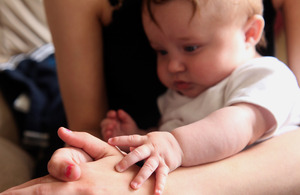PHE welcomes changes to the UK vaccination programme
DH, PHE and NHS England announce vaccination programmes to protect against flu, shingles and rotavirus, and updates to the meningitis C vaccination schedule.

Young infant with mother
The Department of Health, Public Health England and NHS England has today announced a series of changes to the current vaccination schedule to include three new vaccination programmes, which protect against flu, shingles and rotavirus, as well as updating the current meningitis C vaccine schedule.
The rotavirus vaccination programme will start on 1 July 2013 when children under 4 months will be routinely vaccinated against this highly infectious illness, which is the most common cause of vomiting and diarrhoea (gastroenteritis) in infants and young children. Nearly every child will develop gastroenteritis caused by rotavirus by the time they are 5 years old.
In children younger than five years in the UK, this infection is responsible for around 140,000 GP visits and 14,000 hospitalisations every year. The vaccine will be administered as a droplet into babies’ mouths during their 2- and 3-month vaccination appointments.
In addition, children aged 2 years (around 650,000 in total) will also be offered a nasal flu vaccine from September 2013 as part of a number of pilot programmes to vaccinate primary and pre-school aged children against seasonal flu. The pilot programmes will ensure the NHS is appropriately geared up to roll out the programme in full to all pre-school and primary school children in 2014.
There will also be a shingles vaccination programme introduced for people aged 70, with a catch-up programme for those aged up to, and including, 79 years. Shingles is an infection of a nerve that causes pain and a rash along a band of skin by the affected nerve.
The infection is caused by the herpes varicella-zoster virus, which also causes chickenpox. Following chickenpox infection, the virus can lie dormant in the nervous tissue but may reappear following reactivation as shingles. The programme will begin in September 2013 and it is estimated that around 800,000 people in the UK will be eligible for the vaccine in the first year.
The current schedule for protecting people against meningitis C will also be updated. A new teenage booster jab given at around 14 years will replace the vaccine dose that is currently given at 4 months of age – as evidence shows the routine four-month meningitis C vaccine dose is no longer required. The teenage booster jab will be offered in the 2013/14 academic year.
Dr Mary Ramsay, Head of Immunisation at Public Health England said:
The introduction of the oral Rotavirus vaccine in the US and parts of Europe has had a major impact on preventing young children from developing this unpleasant vomiting and diarrhoeal disease. The vaccine is very easy to administer and involves placing a droplet of liquid into the babies’ mouths. In the countries where the vaccine has already been introduced, the uptake has been high and has resulted in rapid and sustained reductions in childhood rotavirus hospitalisations. We are excited to be offering this vaccine as part of the national infant immunisation programme in the UK.
As well as the rotavirus vaccine for infants, the upcoming introduction of childhood influenza and adolescent MenC immunisation programmes along with routine vaccination against shingles for older adults will all continue to contribute to our highly successful vaccination programme which we can boast in the UK.
The decisions to introduce the new vaccination programmes and updates to existing programmes were made after the Joint Committee on Vaccination and Immunisation – a working group of independent vaccine experts - studied all the available evidence and advised that these changes are made to protect more people against disease.
Notes to editors
For further information about the new vaccination schedule please see the Department of Health announcement.
Update 7 May 2013: joint letter from DH, PHE and NHS England on changes to the meningococcal C vaccination schedule
Updates to this page
Published 30 April 2013Last updated 7 May 2013 + show all updates
-
Updated the age at which the new teenage booster jab will be given. This was changed to "around 14 years of age" (as opposed to 12-13 years, as previously stated)
-
Added link to the letter about changes to meningococcal C vaccination schedule
-
First published.